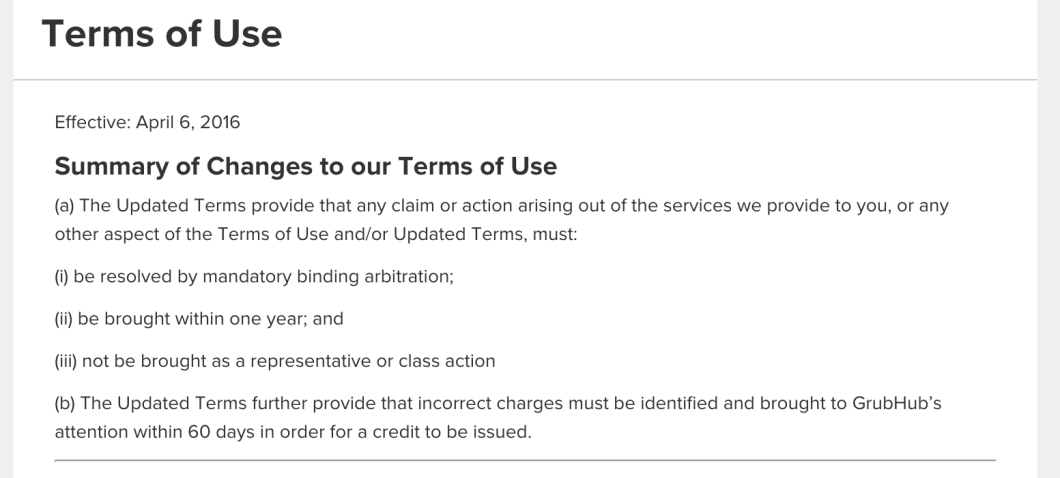GrubHub/Seamless Hates Its Customers, Strips Them Of Legal Right To Sue
If you have a legal dispute with online food delivery portal GrubHub (or its Seamless subsidiary), you will soon lose the ability to resolve that matter in a court of law. And if there are others out there with the same problem as you, you’ll each have to fight GrubHub on your own because the company has decided to view its all of its customers as potential litigants.
GrubHub has started alerting registered users of an impending update to the service’s Terms of Use.
“We are continuing to develop more features on our websites and mobile apps that you will love,” reads the message. “To address these changes, we’ve updated our Terms of Use.”
All the email says after that is that the changes take effect on April 6, 2016, and that simply using either the GrubHub app or website after that date “will indicate your agreement to be bound by the new Term of Use.”
So what are these “features” that “you will love”? Surely they’ll be in this link to the summary of changes to the Terms, right?
Nope. Nothing in here about updates or new features, just the bad news that the Terms have been updated to force GrubHub users to resolve their disputes through a binding arbitration process:

And not only is your ability to sue GrubHub robbed by this clause, so is your ability to enter into arbitration with a class of others who have been similarly wronged by the company.
Also, good luck if you don’t realize within 365 days that GrubHub broke the law. Statute of limitations be damned; you can’t even go into arbitration after one year.
After decades of being a legal tool primarily for compelling businesses to resolve contractual disputes out of the courtroom, forced arbitration has recently become a popular tool for stripping away consumers’ ability to sue the companies they do business with.
=======
UPDATE/CORRECTION: A previous version of this story incorrectly stated that the GrubHub arbitration clause did not include an opt-out for users who don’t want to accept these new terms. A closer look at the terms — confirmed by a rep for GrubHub — confirms that you can opt-out within 30 days.
A rep for the company tells Consumerist via email: “While we believe the updated terms of use offer many advantages to diners, for those that would like to retain a right to litigate any potential claim under the existing terms of use, diners may opt-out in accordance with section VII of the dispute resolution section of the updated terms of use:
VII. Changes
Grubhub reserves the right to change this “Dispute Resolution” section, but any such changes will not apply to disputes arising before the effective date of such amendment. Notwithstanding the provisions of the modification-related provisions above, if Grubhub changes this “Dispute Resolution” section after the date you first accepted this Agreement (or accepted any subsequent changes to this Agreement), you may reject any such change by providing Grubhub written notice of such rejection by mail or hand delivery to: Grubhub, Attn: Dispute Resolutions, 5 Bryant Park, 15th Floor, New York, NY 10018, or by email from the email address associated with your account to: disputeresolution@grubhub.com, within 30 days of the date such change became effective, as indicated in the “Effective” date above. In order to be effective, the notice must include your full name and clearly indicate your intent to reject changes to this “Dispute Resolution” section. By rejecting changes, you are agreeing that you will arbitrate any Dispute between you and Grubhub in accordance with the provisions of this “Dispute Resolution” section as of the date you first accepted this Agreement (or accepted any subsequent changes to this Agreement, as applicable).
=========
Consumer-facing businesses — everything from banks to cable companies to wireless providers to your Starbucks card — now insert clauses like GrubHub’s into their unchangeable, lengthy, mouse-print contracts.
The frequent explanation is that they expedite the resolution of disputes, but critics of arbitration note that the process is heavily imbalanced in favor of companies.
Damages are often severely limited in arbitration cases, meaning it can be difficult to find an attorney willing to represent you. Meanwhile, company lawyers are frequently familiar with the arbitrators who are supposed to be providing an unbiased opinion. One recent report found that a single arbitration firm had handled more than 400 cases for a single chain of nursing homes.
Also, arbitration decisions are generally final, even if the arbitrator made a glaring error that should have changed the outcome of the hearing. In the 2006 Hall Street Associates v Mattel Supreme Court ruling, the nation’s highest court held that, even when there is a clear legal error that should have resulted in a different result for the arbitration, the courts can’t get involved and compel a new hearing.
The Consumer Financial Protection Bureau is currently drafting rules aimed at restricting the use of class action bans on financial products.
“Companies are using the arbitration clause as a free pass to sidestep the courts and avoid accountability for wrongdoing,” said CFPB Director Richard Cordray in 2015. “The proposals under consideration would ban arbitration clauses that block group lawsuits so that consumers can take companies to court to seek the relief they deserve.”
A bigger-picture approach is being proposed in the Restoring Statutory Rights Act, sponsored by Sen. Patrick Leahy (VT) and Sen. Al Franken (MN). That piece of legislation, which sadly stands little chance of being passed in the current Congress, would prohibit the use of arbitration in consumer contracts unless both parties agree to enter arbitration after a dispute has been filed.
Want more consumer news? Visit our parent organization, Consumer Reports, for the latest on scams, recalls, and other consumer issues.

